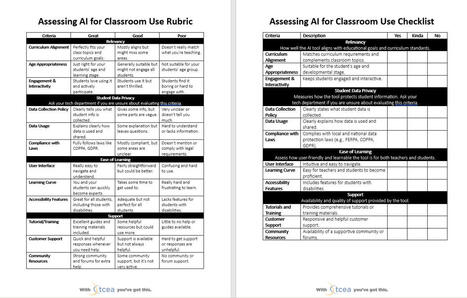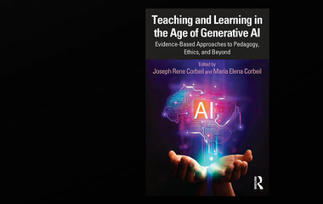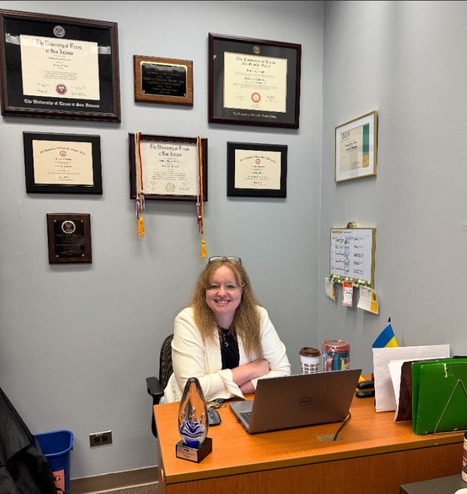As artificial intelligence tools become ubiquitous, districts must make critical decisions that could reshape teaching and learning for years to come.
Get Started for FREE
Sign up with Facebook Sign up with X
I don't have a Facebook or a X account


 Your new post is loading... Your new post is loading...
 Your new post is loading... Your new post is loading...
Watch this video to learn more about the fully online, accelerated, project-based Master of Education in Educational Technology at the University of Texas Rio Grande Valley. For more information, visit: https://www.utrgv.edu/edtech/index.htm
EDTECH@UTRGV's insight:
This 30-hour accelerated program designed to prepare persons in K-12, higher education, corporate, and military settings to develop the skills and knowledge necessary for the classrooms and boardrooms of tomorrow. Students in this program have the opportunity to earn one or more graduate certificates in E-Learning, Technology Leadership, and Online Instructional Design. 
harrietwatkins's curator insight,
August 24, 2024 10:34 PM
This is a fantastic program! Its practical, real-world based and applicable to many areas of industry where teaching and learning, training and development are used.
From
www
To give students more detailed feedback on a writing assignment than she could provide herself, Katie Durkin experimented with AI. She's happy with the results.
EDTECH@UTRGV's insight:
"A teacher used AI tools during two revision cycles of student writing to provide personalized, actionable feedback and rubric-based evaluations, which enhanced student revisions and informed targeted instruction without replacing teacher guidance."
Safeguarding student data and securing the digital future of education is a joint venture to keep Android apps safe for schools.
EDTECH@UTRGV's insight:
"In May 2024, Microsoft identified a critical vulnerability pattern targeting Android applications, ominously called “Dirty Stream.” This vulnerability allows malicious apps to overwrite files, potentially leading to arbitrary code execution, token theft, and data manipulation. Among the apps affected were WPS Office and File Manager, both commonly used for document handling in educational settings."
Discover how AI-powered assessments are transforming eLearning with personalized experiences and real-time feedback. Explore the future of education today!
EDTECH@UTRGV's insight:
"Traditional eLearning courses often present static content, forcing learners to follow a one-size-fits-all approach. AI transforms this by tailoring stories to each learner's pace, preferences, and knowledge gaps"
From
www
"Across industries, companies are racing to integrate AI-powered chatbots and assistants into their operations. If it feels to you like a gold rush, you may have a point. The potential for AI to enhance productivity, streamline workflows and drive competitive advantage is undeniable. However, many organizations make a critical mistake: They rush to deploy AI without first addressing the quality of the information feeding it."
EDTECH@UTRGV's insight:
"AI chatbots are exceptionally good at finding and presenting information in natural language. But they cannot distinguish between valid, up-to-date content and outdated, obsolete or even incorrect information."
This story was first published by Voice of San Diego and is reprinted with permission. Community colleges have been dealing with an unprecedented phenomenon: fake students bent on stealing financial aid funds. While it has caused chaos at many colleges, some Southwestern College faculty feel their leaders haven’t done enough to curb the crisis. This story […]
EDTECH@UTRGV's insight:
"In some California colleges, determining whether a student is fake or real can be difficult"
"A professor at Michigan State University teaches two courses in a virtual reality setting, allowing for focused discussions and learning in a new and engaging environment."
EDTECH@UTRGV's insight:
"Students at Michigan State University can get hands-on experience learning about virtual reality and avatars through a fully VR classroom experience."
"Artificial intelligence has rapidly started finding its place in the workplace, but this year will be remembered as the moment when companies pushed past simply experimenting with AI and started building around it, Microsoft said in a blog post accompanying its annual Work Trend Index report."
EDTECH@UTRGV's insight:
"These so-called Frontier Firms will be built around “on-demand intelligence and powered by ‘hybrid’ teams of humans + agents, these companies scale rapidly, operate with agility, and generate value faster,” according to the report. Microsoft argued that within the next two to five years, every company will be on the journey to becoming one."
There are a lot of AI tools floating around. But which ones are relevant, safe, and easy to use? Evaluate AI with this rubric and checklist! Explore this and more at TCEA TechNotes Blog, your go-to source for educational technology and teaching innovation.
EDTECH@UTRGV's insight:
"This rubric breaks down the key criteria to consider, making it easy for any educator, regardless of how tech-savvy they are, to make informed decisions."
From
www
"Prompt engineering, a role aimed at crafting the perfect input to send to a large language model, was poised to become one of the hottest jobs in artificial intelligence. What happened?"
EDTECH@UTRGV's insight:
"Two years ago, prompt engineering was one of the buzziest jobs in tech, fetching salaries of up to $200,000 on the promise of becoming any company’s 'AI Whisperer.' Now, the role is basically obsolete thanks to the breakneck speed of AI development and companies’ own maturity in terms of understanding how to use the technology."
Why is connectivism pedagogy so relevant to eLearning and the modern tech-centered world? We have all the answers here.
EDTECH@UTRGV's insight:
"Connectivism emphasizes learning through connecting information in a network. With so much info available today, it encourages us to find relevant information, verify it, and stay updated."
From
edscoop
A new study from Oregon State University shows that artificial intelligence can boost creativity in student writing if instructors provide guidance on proper use. The university’s College of Liberal Arts announced the findings last week. After studying two online creative writing courses, researchers found that students who completed their work with the assistance of ChatGPT […]
EDTECH@UTRGV's insight:
"The researchers found that AI served as an equalizer in creative writing, offering the most improvement for lower-performing students and offering relatively little benefit for high-performing creative writing students."
From
www
The nonprofit National Writing Project and online writing platform NoRedInk are starting an online information-sharing community and offering free webinars for educators on the impact of AI on writing instruction.
EDTECH@UTRGV's insight:
"[T]he goal of the NWP partnership is to help teachers understand the changing role of critical thinking in AI-assisted writing practice and instruction." |
Explore the ethical concerns of iris scanning and identity verification with Sam Altman's World ID project. Get classroom-ready materials.
EDTECH@UTRGV's insight:
"Sam Altman's World project is scanning irises across the U.S. to verify who's human—raising massive questions for educators, parents, and students."
Smarter content filtering technology gives K–12 students more access, more appropriately, while locking down dangerous online activity.
EDTECH@UTRGV's insight:
"When schools rely solely on a filter that has a list of “good” and “bad” websites, they miss the gray areas. Sites like YouTube, Reddit and other social media platforms are often universally blocked. Additionally, students have figured out how to use VPNs and proxies, which mask their true destination and intent online."
"In an era where classroom engagement and personalized education are more important than ever, just-in-time teaching (JiTT) emerges as a key strategy for college instructors. This pedagogical approach integrates active learning with the timely use of instructional technology to enhance student understanding and participation."
EDTECH@UTRGV's insight:
"As you integrate JiTT into your teaching practices, remember the key is flexibility and responsiveness to your students' learning needs"
"A new book on teaching and learning with generative AI, co-edited by American education technology professors Joseph Rene Corbeil and Maria Elena Corbeil, moves beyond reactions to AI towards a practice-based guide for educators and staff navigating the challenges of AI in classrooms and curricula.
EDTECH@UTRGV's insight:
Thank you to Karen MacGregor for her wonderful writeup on our new book, "Teaching and learning in the age of generative AI"
To realize their full potential microcredentials must be anchored in strong, scalable frameworks that align education with workforce needs & learner goals.
EDTECH@UTRGV's insight:
"[O]ne of the biggest challenges facing the microcredential movement is inconsistency. Without clear structures and shared standards, these programs risk losing credibility and long-term value."
For today's higher education chief information officer, strategy collides with surprise and the pace never really slows down.
EDTECH@UTRGV's insight:
"Welcome to life as a modern chief information officer, where strategy collides with surprise, and the pace never really slows down."
Early adopters of artificial intelligence are bringing the tech into their districts with thoughtful rollouts, ample training and clear guidance.
EDTECH@UTRGV's insight:
"Three years before ChatGPT’s debut, a team at Gwinnett County Public Schools near Atlanta began studying an intriguing question: How should GCPS prepare students for the future of artificial intelligence? Equally important, how could AI empower teachers to deliver personalized learning?"
In a world where AI can think for us, over-reliance could harm our reflective thinking abilities.
EDTECH@UTRGV's insight:
"[W]hile GenAI makes accessing information quite convenient, it may come at a cost, especially when it comes to how we think about and learn from the information provided by GenAI tools."
An edtech expert describes what substitution, augmentation, modification, and redefinition mean in lesson design—and how to reach that elusive final level.
EDTECH@UTRGV's insight:
“How often am I striving for transformational use of technology in the classroom? As engagement often equals increased learning, how can I move toward the redefinition level?”
From
www
What if our workplace success metrics are out of date? We’ve long measured productivity in terms of output—tasks completed, hours logged, KPIs hit. But in a modern, knowledge-based economy increasingly shaped by artificial intelligence, these metrics no longer tell the full story.
EDTECH@UTRGV's insight:
"Today, the return on investment (ROI) that matters most is not just about doing more, faster. It’s about creating the conditions for people to do their best, most impactful work—because when people are empowered, engaged, and enabled by the right technology, business outcomes follow."
|

|
Scooped by
EDTECH@UTRGV
May 1, 10:11 AM
|
When leading large-scale digital transformation efforts at higher education institutions, prioritizing people alongside technology efforts can lead to
"Fostering a culture of care helps to create conditions that support individuals and teams, improving employee retention. Empathetic leadership and a human-centered approach can lead to stronger project outcomes and help build a more resilient institution.""Fostering a culture of care helps to create conditions that support individuals and teams, improving employee retention. Empathetic leadership and a human-centered approach can lead to stronger project outcomes and help build a more resilient institution.

|
Scooped by
EDTECH@UTRGV
May 1, 10:07 AM
|
The Massachusetts Department of Elementary and Secondary Education is taking first steps in a strategic plan to help integrate artificial intelligence into the state's K-12 schools within the next three years.
"[T]he Massachusetts Department of Elementary and Secondary Education (DESE) is developing resources to help schools build a shared understanding of how AI works, train staff on AI integration and student data privacy, and create AI usage guidelines and policies"






























"76% of educators said they found value in generative AI solutions, and 73% said the technology saves them time."